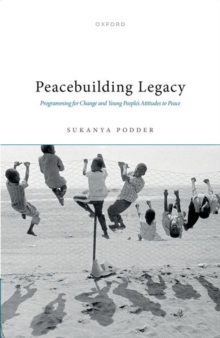Description
| Product ID: | 9780192863980 |
| Product Form: | Hardback |
| Country of Manufacture: | GB |
| Title: | Peacebuilding Legacy |
| Subtitle: | Programming for Change and Young People's Attitudes to Peace |
| Authors: | Author: Sukanya Podder |
| Page Count: | 334 |
| Subjects: | Peace studies and conflict resolution, Peace studies & conflict resolution, Age groups: children, Age groups: adolescents, International relations, Age groups: children, Age groups: adolescents, International relations |
| Description: | Peacebuilding Legacies addresses an important gap relating to the long-term effects of peacebuilding programmes involving children and young people. Podder unpacks the concept of peacebuilding legacy through the lens of time, transformation, and intergenerational peace. A fundamental challenge plagues the global peacebuilding community. How can technocratic approaches to peacebuilding that are rooted in short-term, project-based execution of activities, further the longer-term transformative outcomes like altering young people''s attitudes and beliefs about peace and violence?In response to this global challenge, in Peacebuilding Legacy, Sukanya Podder analyzes the long-term effects of peacebuilding programmes involving children and young people. Podder unpacks the concept of peacebuilding legacy through the lens of time, transformation, and intergenerational peace. Podder also develops unique qualitative cues for measuring legacy in terms of the institutional, normative, and organizational logics. If norms resonate strongly with the local context, they are likely to encourage strong retention and meaningful adoption over time. Successful institutionalization of project models through planned handover to successor national organizations, or government departments, holds the key to stronger local ownership. Organizational learning and reflection can support this process through a more strategic approach to programming, and through post-exit studies. Regarding attitude change, Podder found that, the media and peace education projects that targeted individuals'' ingrained beliefs and values but overlooked the role of group social norms had only limited persuasive effects. To shift the values, practices, norms, and beliefs of the younger generation, the mindset of the older generation must also be targeted. Changes in the legal, political, economic, and other social institutions are critical for long-term and meaningful transformation. This requires adopting an ecological model of peace. |
| Imprint Name: | Oxford University Press |
| Publisher Name: | Oxford University Press |
| Country of Publication: | GB |
| Publishing Date: | 2022-09-13 |


